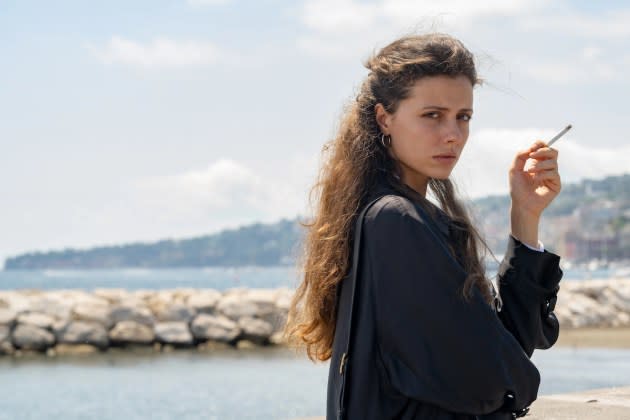‘Parthenope’ Review: Paolo Sorrentino Crafts an Exquisite Treatise on Cinematic Beauty

A decades-spanning drama about a young woman born in Naples — the hometown of writer-director Paolo Sorrentino — “Parthenope” is an exquisite treatise on cinematic beauty. Chronicling her birth, her youthful teenage summers and the years she spends adrift as a young adult, the film is an intoxicating reflection on the way people and places are seen, and the way they see themselves.
Celeste Dalla Porta delivers a beguiling performance as the film’s eponymous subject, a woman of such stunning beauty that people stop and stare. Her allure is practically disruptive, an idea the camera embodies by introducing her through pristine, symmetrical vistas that appear suddenly, as though they were demanding the edit skip past its dramatic connective tissue. She is named, after all, for the founder of Naples, and one of the six sirens of Green mythology, but Sorrentino maintains a consistent awareness of the ogling idealism he applies to Parthenope. As young lovers and strangers stare at her body, the frame remains transfixed on her expression, one that initially bears the naive allure of a young muse or a cinematic debutante who exists, first and foremost, for the camera’s gaze.
More from Variety
Her beauty, she is told — by a small but surprising character played by Gary Oldman — will open doors and start wars, and neither Della Porta nor Sorrentino shy away from presenting Parthenope as a carefree seductress who revels in her youth. But she wants something more, and is afraid of being perceived as vacant — the way the camera occasionally perceives her at first — spurring on an academic career in anthropology under the tutelage of a grumpy professor, Devoto Marotta (Silvio Orlando), one of the only men who seems to speak the truth to her, albeit wrapped in riddles.
As these notions of societal expectation (born of a heightened cinematic fetishism akin to Perfume commercials) collide with her own desires, Della Porta’s performance appropriately evolves. Though she never answers the question of what exactly lies behind the character’s eyes — something she seems to ask of herself at every turn — she adds layer upon layer to the existing mystery of who Parthenope is and what she wants, starting with a smile that spreads from her mouth alone, in early scenes, to one we can recognize in the creases around her eyes.
Her story is told through evolving hairstyles too (complimented by Carlo Poggioli’s costumes), which not only age Parthenope from her teens to her early 30s, but set the stage for where she is in life, between her warring desires for play, domestic contentment, professional success and so on. Every department functions at its optimum to ensure Parthenope’s evolution, until eventually she seizes the power of her own charm in a moment of surprising, sacrilegious liberation.
Along the way, a family tragedy sends her emotionally adrift, and as she’s ushered toward becoming a star of the silver screen, her conversations with older actresses considered past their prime (owing to age, botched cosmetic surgeries and falling hair) illuminate the nature of her own desires — romantic, academic and otherwise. Each scene unfolds in dreamlike fashion despite being tethered to reality, thanks in large part to Lele Marchitelli ‘s operatic score, and to the Neapolitan setting, whose most traditionally (and even non-traditionally) beautiful men and women weave in and out of Parthenope’s story.
These detours, as Parthenope wanders the city’s streets, take the form of various rituals both beautiful and troubling, whether literal rituals of celebration or acts of lust and emotional intimacy, or of something more perverse (in one case, a sex scene that’s as “plot first” as they come, which the movie soundly rejects). All of this culminates in a surreal sequence that, in any other movie, might trade too heavily on fear and pity. But this ends up subverted by Sorrentino’s refashioning of everything beauty entails, in a film that recognizes and reckons with how the movie camera has, over the last century, cemented limiting notions of what we see, and what images of women entail.
“Parthenope” is a film that rumbles with the hum of nostalgia, recapturing the feeling of youthful, summer freedom while refusing to shy away from the uncertainties of young adulthood. But it’s no mere coming-of-age story; rather, it’s a film about coming-to-oneself. It’s a moving artistic quest, as a filmmaker explores, through the tale of one woman finding her inner life — both beyond her beauty, and through it — the reasons he wields his camera in the first place: in pursuit of transformative truths about the way we see the world, and ourselves, best unveiled through aesthetic discovery.
Best of Variety
Sign up for Variety’s Newsletter. For the latest news, follow us on Facebook, Twitter, and Instagram.

